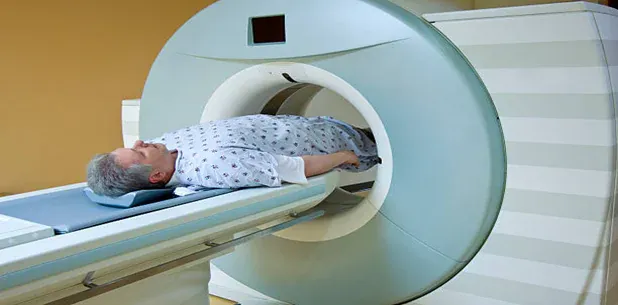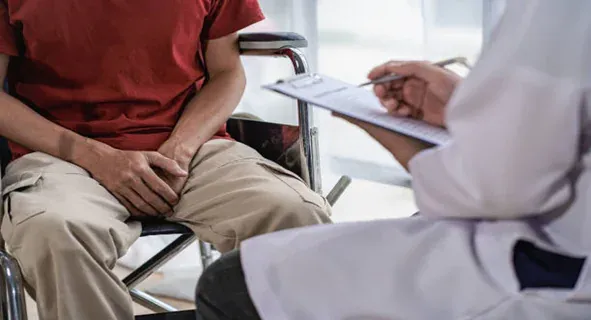Cancer of prostate is one of the most common cancers in men in our country. Treatment of prostate cancer uses multiple modalities like surgery, radiotherapy, chemotherapy, and hormonal therapy. Most of the times these modalities are used in combination depending upon the stage of cancer, age and performance status of patient, biological aggression of the disease, PSA level (this is a blood test done to measure the level of a chemical secreted by your prostate), logistics etc. In this excerpt we will majorly focus on the select group who has been adviced for radical prostatectomy followed by radiotherapy. Radical prostatectomy is the name of the surgery wherein we remove a cancerous prostate with or without the nearby nodal areas where it could have spread. Radiation after prostatectomy is a crucial phase in the continuum of prostate cancer treatment. This treatment involves targeted radiation to eliminate remaining cancer cells or prevent recurrence after surgical removal of the prostate gland. Understanding the nuances of radiation therapy after prostatectomy and its implications is vital for your well-being and recovery.
Radiation Oncology at MACS Clinic, Bangalore, led by Dr. Nisha Vishnu, a prominent oncologist in India, specializes in radiation for prostate cancer.
We combine cutting-edge technology with compassionate care to offer comprehensive and personalized treatment for prostate cancer. Whether patients require radiation therapy after prostatectomy or advanced cancer treatment in Bangalore, we are committed to being a source of hope and support throughout their healing journey.
In this blog, we delve into the intricacies of radiation therapy after prostatectomy.
Post-operative Radiotherapy- When and Why
Post-operative radiotherapy (PORT) is a crucial treatment option after prostatectomy and it is an active area of research and advancement where guidelines have changed over the last few years. More than the treatment itself it is important for an oncologist to understand whom to offer the treatment. Only around 30% of prostate cancer patients undergo PORT to minimize the risk of cancer recurrence. Research shows that in patients for whom it is indicated, PORT reduces the risk of cancer recurrence by 50%.
Timing:
In earlier times where postoperative radiotherapy was offered to most high-risk cases. Current research supports “wait and watch – intervene when necessary”. This means even in high-risk patients your radiation oncologist will wait and closely observe you with periodic PSA testing. PSA is a chemical that is secreted by prostate cells. It is easily and reliably measured by way of a simple blood test. In prostate cancers this chemical in blood increases. Hence this chemical is a surrogate marker of disease activity. Closely watching PSA after surgery gives an indication of how much cancer is left behind post-surgery and how actively are they growing.
Hence Post-operative radiotherapy is typically recommended when:
- Pathological examination reveals aggressive features like positive surgical margins or high-grade tumors.
- There is evidence of cancer spreading extensively beyond the prostate.
AND
- High post-operative baseline PSA or PSA levels continue to rise after surgery, indicating residual cancer cells
Purpose:
Post-operative radiotherapy serves several crucial purposes:
- Reduce the risk of cancer recurrence by targeting remaining cancer cells.
- Improve long-term survival rates by eradicating microscopic disease.
- Enhance the effectiveness of treatment when combined with surgery
- Lower the likelihood of needing additional treatments if cancer returns
Benefits:
Opting for post-operative radiotherapy offers significant benefits such as:
- Increased chances of achieving complete remission.
- Minimized risk of cancer spreading to nearby tissues or distant organs.
- Potential to avoid or delay the need for chemotherapy.
- Improved quality of life by reducing the anxiety of cancer recurrence.
At MACS Clinic, our seasoned radiation oncologists can tailor the timing and necessity of post-operative radiotherapy based on your circumstances. Open communication and shared decision-making ensure you receive the most appropriate care aligned with your goals and preferences.
Types of Radiation Therapy
External Beam Radiation Therapy (EBRT):
- Delivers high-energy rays from outside the body to the tumor.
- Targets cancer cells while minimizing damage to surrounding healthy tissue.
- Typically administered daily over several weeks.
- Is painless, requires no anesthesia and is an OPD process.
Different procedures or techniques of EBRT used in treating pancreas are:
- 3-Dimensional Conformal Radiotherapy (3D-CRT):
In this technique beams sized and shaped as per the treatment volume are focused on to the treatment area.
Intensity-Modulated Radiation Therapy (IMRT):
Advanced form of EBRT that focuses 6-7 beams from different angles, with each beam divided into smaller beamlets and the intensity of the radiation each of these beamlets are adjusted to tailor higher dose into the target while sparing the adjacent normal organs. Allows for even more precise targeting of the tumor with lesser side effects.
Image guided Radiation Therapy (IGRT):
Advanced form of IMRT that has everyday imaging and correction of positional errors integrated into the treatment process to make the treatment more accurate.
Volumetric Arc Radiation Therapy (VMAT):
An advanced form of EBRT is that instead of treating patients by projecting beams from different angles, the gantry of the machine moves in the form of a continuous arc and treats the patient. This treatment has the advantage of being faster as compared to IMRT/IGRT.
Consult highly qualified radiation oncologists to find the best option for you. Book an appointment now!
Side Effects of Radiation Therapy After Prostatectomy
Radiation is a safe yet highly effective treatment. The initial 1-2 weeks of your therapy is usually smooth with not many side effects. Most side effects start after 2 weeks, builds up over a period of time and reaches to its maximum intensity by the end of the treatment. Similarly the side effects comes down over a period of 4-6 weeks after radiation.
You might experience urinary issues, like frequency or urgency, after radiation therapy.
- Some men may notice changes in bowel habits, such as diarrhoea due to rectal irritation.
- Fatigue is common during radiation treatment but usually improves afterwards.
- Skin irritation or redness in the treatment area is possible but typically temporary.
- Long-term side effects like urinary or bowel problems tend to improve over time.
Stay proactive in managing side effects. Seek expert advice promptly if you experience any discomfort.
Dos and Don’ts During Radiotherapy
Dos During Radiotherapy:
- Follow the schedule provided by your oncologist.
- Keep the treated area clean as advised.
- Stay hydrated by drinking plenty of water.
- Eat a balanced diet rich in nutrients to support your body’s healing process.
- Communicate any side effects or concerns immediately to your medical team.
Don’ts During Radiotherapy:
- Don’t skip appointments without consulting your healthcare provider.
- Avoid using harsh soaps or lotions on the treated area.
- Don’t expose the treated area to direct sunlight without protection.
- Avoid smoking and alcohol consumption. They can interfere with treatment effectiveness.
- Don’t hesitate to ask questions or seek support if you experience anxiety or stress during treatment for prostate cancer.
Life After Radiation Therapy
After completing radiation therapy, your journey doesn’t end; it’s just another phase. Your oncologist will schedule follow-up appointments. It is essential to attend regular check-ups, even if you feel well. These follow-ups help address any concerns and maintain your long-term health and well-being.
During these visits, your oncologist will:
- monitor your progress
- check for any signs of recurrence
- manage any side effects you may be experiencing
Initially, these appointments will occur at regular intervals, typically every few months. As you progress in your recovery, the frequency of appointments may decrease.
To track your health and detect any changes, your medical team may conduct various tests such as:
- Physical examinations
- blood tests
- imaging scans
- prostate-specific antigen (PSA) tests
PSA levels can indicate the presence of prostate cancer cells. So, monitoring these levels over time is crucial for detecting recurrence early.
Remember, staying proactive with your follow-up care is essential. It can help maintain your health and peace of mind post-radiation therapy.
Don’t forget your follow-up appointments! Book yours now to stay ahead of your health.
Conclusion
Radiation therapy after prostatectomy is an essential component in the fight against prostate cancer. It’s not just about battling the disease; it’s about reclaiming your life and embracing hope.
In the vibrant landscape of cancer treatment in Bangalore, MACS Clinic, under the guidance of Dr. Sandeep Nayak and Dr Nisha Vishnu, offers customized and comprehensive care. This ensures patients receive the best possible outcomes.
With expertise, innovation, and compassion, MACS Clinic offers hope for prostate cancer patients. Take control of your health, stay informed, and never lose sight of the possibilities beyond.
Frequently Asked Questions:
1. Can you live 20 years after prostatectomy?
Yes, many patients can live more than 20 years after prostatectomy, especially with early detection and appropriate follow-up care.
2. How many radiation treatments are needed for prostate cancer?
Post surgery if indicated prostate cancer patients may undergo 30-33 radiation treatments. Multiple factors including age, general make up and adjoining health conditions of the patient, biology and stage of the disease, logistics etc would play a major role in deciding the dosing and treatment extend.
3. How many sessions of radiotherapy are normal?
Normal radiotherapy sessions for prostate cancer usually range from 5 to 8 weeks, with daily treatments on weekdays.
4. What should I avoid after radiation for prostate cancer?
After radiation, it is advisable to avoid:
- Sun exposure to treated areas
- Smoking
- Certain foods that may irritate the digestive system (like oil, excess masalas)
5. Does radiation for prostate cancer cause impotence?
Radiation may rarely affect sexual function temporarily. However, modern radiation techniques aim to minimize such side effects. Many patients regain normal function over time.
6. How long does it take to recover from radiation for prostate cancer?
Recovery time varies from patient to patient. Most patients can resume normal activities shortly after completing radiation therapy.
7. Is radiation therapy painful?
Radiation therapy itself is painless. Yet, some patients may experience discomfort or side effects during or after treatment. It can be managed with medication or other interventions.




